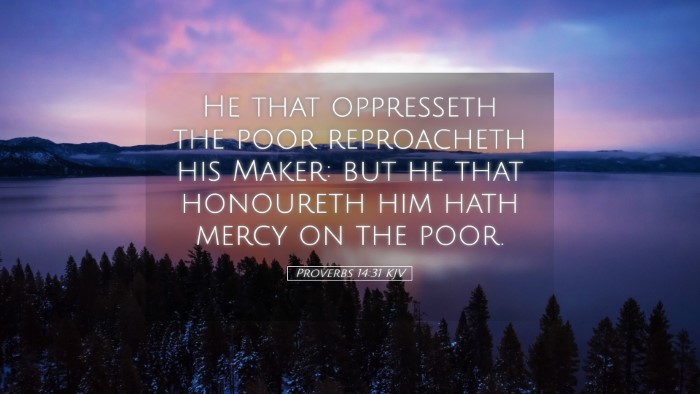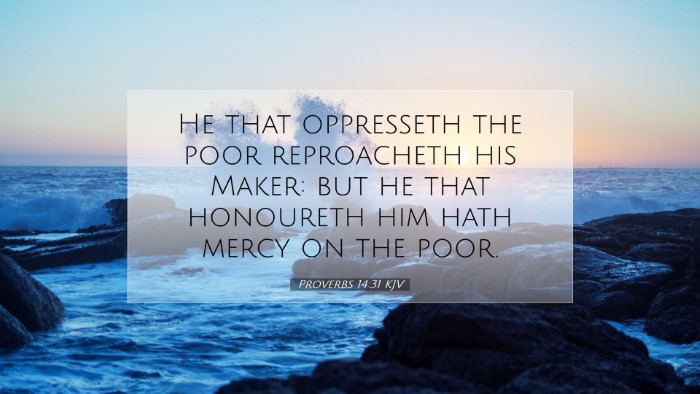Proverbs 14:31 Commentary
Verse: “He that oppresseth the poor reproacheth his Maker: but he that honoureth him hath mercy on the poor.”
Introduction
This profound verse from the Book of Proverbs not only addresses the moral implications of how one treats the vulnerable in society but also reflects on the relationship between ethical behavior and one’s relationship with God. Drawing on insights from respected public domain commentaries, this commentary aims to elucidate the depth and nuances of this significant scripture.
1. The Core Message
Proverbs 14:31 presents a juxtaposition between two types of behavior: oppression of the poor and the honorable treatment of those in need. The verse highlights that how individuals treat the disadvantaged is a direct reflection of their attitude toward God Himself.
1.1 Oppressing the Poor
Matthew Henry notes that oppression of the poor is not just a social injustice; it is a profound affront to the Creator. To "reproach" God in this context implies that mistreating the poor is akin to showing contempt for the divine order he established.
Similarly, Albert Barnes emphasizes that those who exploit the poor demonstrate a fundamental misunderstanding of their responsibility as stewards of God’s creation. When an individual oppresses the impoverished, he or she fails to recognize the intrinsic value bestowed upon every human being by their Maker.
1.2 Honoring God through Mercy
The latter part of the verse asserts that “he that honoureth him hath mercy on the poor.” Adam Clarke suggests that honoring God is manifested in active benevolence towards others, particularly those less fortunate. When one shows mercy to the poor, it is an act of worship and reverence toward God, reflecting His character of compassion.
2. Theological Implications
This verse presents significant theological implications regarding humanity's relationship with God and social ethics. It highlights a foundational principle in Christian teachings: that ethical living cannot be separated from one’s spiritual life.
2.1 Reflecting God’s Character
According to Henry, when one shows mercy to the poor, it is a reflection of God's grace. God’s own character is embedded in caring for the marginalized, and thus believers are called to mirror this aspect of divine love and justice.
2.2 Accountability to God
Barnes indicates that there is an intrinsic accountability each person carries to God for their treatment of others, particularly the poor. This verse invites reflection on the consequences of one’s actions and challenges believers to align their practices with scriptural mandates.
3. Practical Applications
Understanding Proverbs 14:31 not only enriches theological discourse but also calls for practical application in the lives of believers, particularly for pastors and church leaders.
3.1 Social Justice Advocacy
Church leaders are encouraged to engage in social justice advocacy as a means of honoring God and demonstrating His mercy. As Clarke posits, mercy and advocacy are not merely optional extras in the Christian life but essential elements that reflect true faith.
3.2 Mobilizing Congregations
Pastors are urged to mobilize their congregations towards acts of charity and kindness to the poor. Developing outreach programs and community resources can embody the mercy spoken of in this verse, providing much-needed support to those facing hardships.
3.3 Teaching Responsible Stewardship
Educational initiatives on responsible stewardship and the ethical treatment of the underprivileged should be prioritized. By fostering an understanding of how one’s actions reflect their relationship with God, believers can be inspired to live more ethically in all areas of their lives.
4. Concluding Thoughts
Proverbs 14:31 serves as a poignant reminder of the intertwining of faith and ethics. The wisdom offered in this verse beckons believers to a higher standard of living—one that not only honors God but also uplifts and respects the dignity of every person, especially the marginalized. Engaging with the insights from respected commentators enriches our understanding and compels us to live out these principles.
As we ponder this verse, let us commit to not just recognizing its truth but actively embodying it in our lives, churches, and communities, fostering an environment of compassion and mercy that reflects the heart of God.


